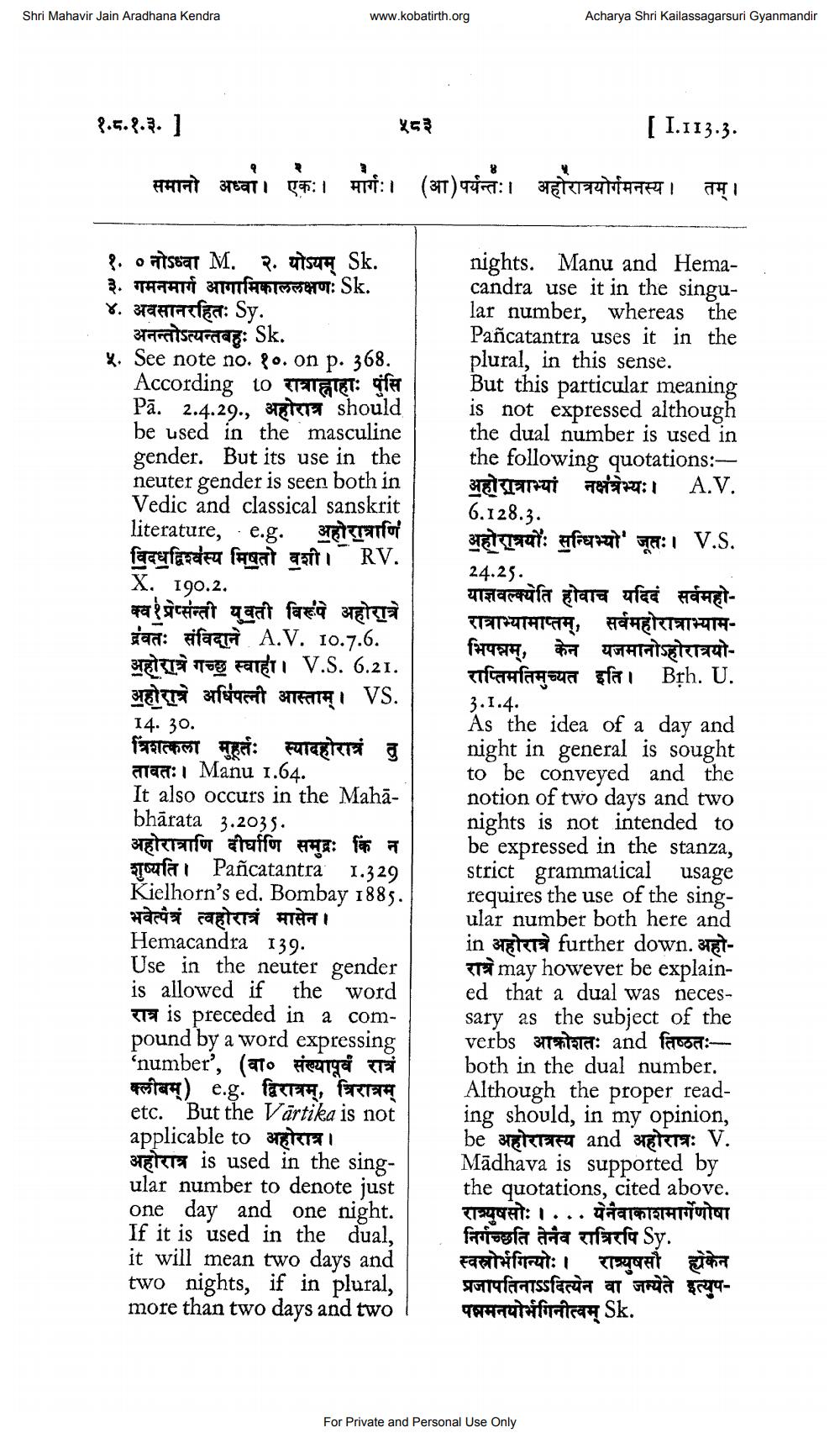________________
Shri Mahavir Jain Aradhana Kendra
www.kobatirth.org
Acharya Shri Kailassagarsuri Gyanmandir
५८३
१.८.१.३. ]
[I.113.3. समानो अध्वा। एकः। मार्गः। (आ)पर्यन्तः। अहोरात्रयोर्गमनस्य। तम्।
१. ० नोऽध्वा M. २. योऽयम् Sk. ३. गमनमार्ग आगामिकाललक्षणः Sk. ४. अवसानरहितः Sy. __अनन्तोऽत्यन्तबहुः Sk. ५. See note no. १०. on p. 368.
According to रात्राहाहाः पुंसि Pa. 2.4.29., अहोरात्र should be used in the masculine gender. But its use in the neuter gender is seen both in Vedic and classical sanskrit literature, - e.g. अहोरात्राणि विदधद्विश्वस्य मिषतो वशी। RV.
X. 190.2. क्वप्रेप्सन्ती युवती विरूपे अहोरात्रे द्रवतः संविदाने A.V. 10.7.6. अहोरात्रे गच्छ स्वाही। V.S. 6.21. अहोरात्रे अधिपत्नी आस्ताम्। VS.
14. 30.
त्रिंशत्कला मुहूर्तः स्यावहोरात्रं तु तावतः। Manu I.64. It also occurs in the Mahābhārata 3.2035. अहोरात्राणि दीर्घाणि समुद्रः किं न Toufal Pañcatantra 1.329 Kielhorn's ed. Bombay 1885 भवेत्पत्रं त्वहोरात्रं मासेन । Hemacandra 139. Use in the neuter gender is allowed if the word रात्र is preceded in a compound by a word expressing 'number', (वा० संख्यापूर्व रात्रं क्लीबम्) e.g. द्विरात्रम्, त्रिरात्रम् etc. But the Vārtika is not applicable to अहोरात्र। अहोरात्र is used in the singular number to denote just one day and one night. If it is used in the dual, it will mean two days and two nights, if in plural, more than two days and two !
nights. Manu and Hemacandra use it in the singular number, whereas the Pañcatantra uses it in the plural, in this sense. But this particular meaning is not expressed although the dual number is used in the following quotations:अहोरात्राभ्यां नक्षत्रेभ्यः। A.V. 6.128.3. अहोरात्रयोंः सन्धिभ्यो' जूतः। V.S. 24.25. याज्ञवल्क्येति होवाच यदिदं सर्वमहो
रात्राभ्यामाप्तम्, सर्वमहोरात्राभ्यामभिपन्नम्, केन यजमानोऽहोरात्रयोराप्तिमतिमुच्यत इति। Brh. U. 3.1.4. As the idea of a day and night in general is sought to be conveyed and the notion of two days and two nights is not intended to be expressed in the stanza, strict grammatical usage requires the use of the singular number both here and in अहोरात्रे further down. अहोरात्रे may however be explained that a dual was necessary as the subject of the verbs आक्रोशतः and तिष्ठतःboth in the dual number. Although the proper reading should, in my opinion, be अहोरात्रस्य and अहोरात्रः V. Mādhava is supported by the quotations, cited above. रात्र्युषसोः। ... येनैवाकाशमार्गेणोषा निर्गच्छति तेनैव रात्रिरपि Sy. स्वस्रोभगिन्योः। रात्र्युषसौ ोकेन प्रजापतिनाऽदित्येन वा जन्यते इत्युपपन्नमनयोर्भगिनीत्वम् Sk.
For Private and Personal Use Only




